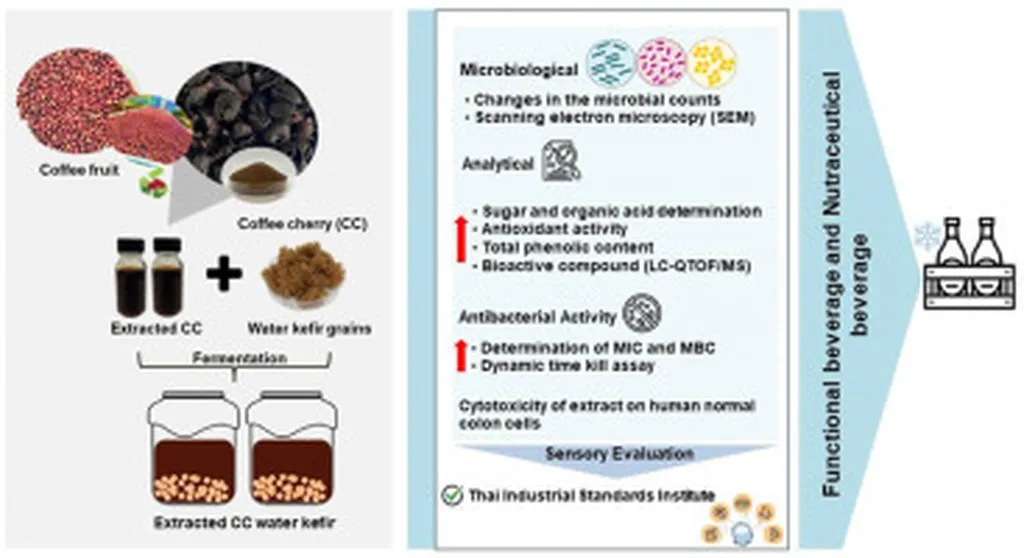In the ever-evolving world of functional foods, a recent study has shed light on the potential of cascara, the coffee cherry’s often-discarded skin, to enhance the nutritional profile and sensory qualities of soy milk yogurt. Published in the *Jurnal Pangan dan Agroindustri*, the research led by Nurofah Eka Kurnia Octaviani from Universitas PGRI Semarang, explores the physicochemical, microbiological, and sensory characteristics of soy milk yogurt fortified with cascara extract.
Cascara, a byproduct of coffee production, is rich in antioxidants and polyphenols, making it a promising candidate for value addition in probiotic beverages. The study investigated the impact of different fermentation times (8, 12, and 24 hours) and cascara extract concentrations (0.5%, 1%, and 1.5%) on the final product. The results revealed a range of promising outcomes, with the 24-hour fermentation period combined with 1% and 1.5% cascara extract yielding the most favorable results.
The yogurt samples exhibited a pH range of 3.24 to 3.63, indicating optimal acidity for probiotic survival. Color analysis showed subtle variations, with L values ranging from 64.32 to 62.06, a* values from -1.7 to -0.35, and b* values from 7.55 to 8.79, suggesting that the addition of cascara extract did not significantly alter the visual appeal of the yogurt. Viscosity, a crucial factor for consumer acceptance, ranged from 475.33 to 771.67, with higher concentrations of cascara extract contributing to a thicker, more desirable texture.
Protein content varied from 2.86% to 4.92%, ensuring that the yogurt retained its nutritional value. Antioxidant activity, a key health benefit, ranged from 7.69% to 51.47%, with higher cascara concentrations correlating with increased antioxidant capacity. Total titratable acidity and total lactic acid bacteria (LAB) counts were also within acceptable ranges, ensuring product safety and efficacy.
“The addition of cascara extract not only enhances the nutritional profile of soy milk yogurt but also opens up new avenues for sustainable utilization of coffee byproducts,” said Octaviani. This research highlights the potential for cascara to be integrated into the agriculture and food processing sectors, creating value from what was once considered waste.
The commercial implications of this study are significant. With the growing demand for functional foods and sustainable practices, the integration of cascara extract into soy milk yogurt production could offer a competitive edge to manufacturers. Farmers and coffee processors could also benefit from the added revenue stream, as cascara could be sold or processed into extracts for use in various food products.
As the food industry continues to seek innovative ways to meet consumer demands for healthier, more sustainable options, research like this paves the way for future developments. The findings suggest that cascara extract could be a valuable addition to other dairy and non-dairy products, further expanding its commercial potential.
In an era where sustainability and health are at the forefront of consumer concerns, this study offers a glimpse into the future of functional foods. By leveraging the antioxidant and polyphenol-rich properties of cascara, the agriculture and food industries can create products that are not only nutritious but also environmentally friendly. As Octaviani and her team continue to explore the potential of cascara, the possibilities for innovation in the food sector seem boundless.

